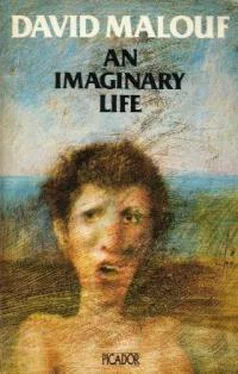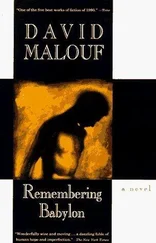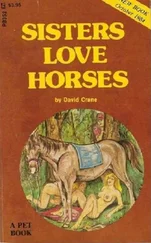I watch him sleep. His limbs twitch like a dog’s, with little involuntary spasms along the inside of the thighs. Does he dream? If only I could be certain he was dreaming I would know that what I have to contact at last, what I have slowly to lead up through the ladders of being in him, is still there. I must know that he can dream. I must assure myself that he can smile, that he can weep.
But I have not even described him.
He is about eleven years old, tall, strongly but scraggily made, with the elbow and knee joints enlarged and roughly calloused. There are sores on his arms and legs, and old scars that appear as discolorations of the flesh, brownish under the yellow tan. The limbs are lightly haired, the chest hairless; but all along the spine there is a hairline, reddish in color like a fox, and it is this that terrifies the women and has made them unwilling to touch him, though the phenomenon is common enough. You may observe it in small children everywhere, as they play naked on doorsteps or splash about in summer under water showers. It usually goes unremarked. Only in this boy has it become, for the women, some sort of sign. That and the feet, which are splayed and hardened from being unshod in all weathers, the toenails worn away, the underside of the foot thickened to a crust as deep perhaps as an earthenware dish, but in no way resembling anything other than a normal foot. The rumor that he is covered with hair and has hooves, which the boy Lullo brings back from the village, is absurd. I dragged the boy in this evening and made him look at the Child and tell me what he saw. But he was too terrified to look properly, and though he has seen what there is to see, I know he is not convinced. What he imagines is so much more powerful than the facts.
I know what he thinks. He thinks I have somehow bewitched the Child’s hooves into stunted feet to deceive him, or that I have bewitched him.
I had imagined that the boy, being something like the same age as the Child, might have some special interest in him, some special sympathy. But he has none. He regards the Child with loathing, as if he were somehow about to be displaced here by a changeling; as if - is it that? - the Child might, while he was sleeping, steal his spirit. These people believe profoundly in sleepwalkers and stealers of souls. Do they suspects, as I have begun to do, that the Child has lost his spirit, and may, while we see him curled asleep in his corner, be capable, like the shaman, of walking out of his body, through the walls into the next room, and into the boy Lullo’s body while he is absent on one of those dream journeys small boys are accustomed to make, into the hunting woods or out over the river? The old woman and the boy’s mother, I know, are encouraging him in this, because of his influence with the old man. But Ryzak, for what reason I do not know, remains my supporter in the business. Against the women. And against the shaman, who has come only once to examine the Child, and on that occasion refused to sing -another fact that the women mutter over and hold against me. The shaman and the women, of course, are in league.
So all day we sit in the half-dark.
I have come to guess a little of what the Child thinks by examining his features, but at no time have we communicated as before, when we spoke to one another in the woods. It is as if the spirit in him that I spoke to then were no longer present. I watch the mouth with its small, broken teeth. He has a way of drawing his lips back over them and taking the breath in sharp as if he were in pain; though he makes the same gesture, I notice, when he is exciting himself, and it is in this gesture that the odd bone structure is revealed, the high cheekbones, the pointed chin, the lines of the jaw. The eyes too I watch. They are very black, and deep set. The eyebrows tilt upward. The hair, which we have washed and cropped a little, is inky black, straight, and coarse in texture, not at all silky or fine, though this may be because he is undernourished or because his spirit is so low in him, or no longer there at all. I have noticed before how the hair takes on the shine or the dullness of the spirit, especially in the ill. He still seems, for all our scrubbing, less than clean. As if the earth has got so deep into his skin that he has taken on its color. It is perhaps dirt in the old wounds that accounts for the brownish scars on his limbs. He is not at all beautiful, as I had imagined the Child must be. But I am filled with a tenderness, an immense pity for him, a need to free him into some clearer body, that is like a pain in my own. I think and think. What must the steps be? How should I begin? Kindness, I know, is the way - and time. To reveal to him first what our kindness is, what our kind is; and then to convince him that we belong to the same kind. It is out of this the he must discover what he is.
But we have begun so badly. How can he possibly think of us as anything but cruel? Which of the beasts would have done this to him? Which of the beasts would hunt him down on horseback, truss him up, carry him away from all he has ever known? Then there is the spitefulness of the boy, who I have decided must be kept away. And the hostility of the women. In the end I must do it all myself. I must, at first, be the only one he has contact with.
I think, strangely, of the wolf in my dream that threatened to consume the whole pool of my being, and begin to be afraid. The weeks pass.
I no longer leave the room now when the women bring his food. At first he was wary, as if perhaps I had set a trap for him as before. He edged towards the bowl, sniffed, examined it, took it in his hands, and all the while as he ate, more slowly than before, watched me over the rim with his deep black eyes, which seemed these times to have points of red. Then when he had cleaned out the last of the stuff with his finger, he rolled the bowl over the floor and dragged himself back to his corner, where he crouched with his knees up, waiting for me perhaps to make some move. Now he eats without being aware of me. As if I were not there. Grunting as he feeds.
I have also brought my straw pallet into the room, and sleep in the corner opposite him. He has got used to that as well. And when I begin to feel again that I have been in contact with him, though it is impossible to know when the contact occurred. It may have been while I was washing him. He submits to that easily enough, though with no sense of his being touched in any part of his real body. It may have been in some chance meeting of the eyes as we pass in and out of each other’s sight. Or it may have been in our sleep, as we move through this room in the same liquid medium, as if floating together in a pool, some casual meeting of one dream with another, a flowing into his sleep, or of his sleep into mine, at some point that the waking mind would not know of. Or in stirring about here, one part of the invisible current I make as I write, as my pen dips in the ink and my hand moves across the parchment, or as I drag the razor over my chin, may have broken against him so that he felt it. Who can tell? But I am certain now that the contact has been made. He no longer whimpers, or rocks back and forth on his knees, making little growls at the back of his throat. He watches. And I begin to believe that something I will have to call his mind has been engaged, and has started to move out into the room. I feel it. It is there after all. It is there. Some process of reaching up out of himself has begun of its own accord. Today, while I was washing him, he laid his fingertips, with a kind of timid curiosity, on the back of my hand, feeling the texture of the skin - then drew back quickly, as if I might object and punish him. The effect was odd and a little frightening. As if an animal had come up in the dark and touched me with its tongue. Is he beginning to feel at last for some notion of his own being? Is it, for him, like touching his reflection in a glass? Has he, I wonder, any conception of what his own body is, what it looks like, what dimensions it possesses, how it displaces its own small part of the universe? Is it his body he must imagine first, and only after that come to a knowledge of what he is? There is an intelligence. I feel it. More and more often now, as I settle into some work of my own, writing for example, I am aware of a separate center of energy in the room that disturbs my thoughts, that sets up eddies that beat like waves of light towards me and break against the edge of my consciousness. The room, I know, is filled with emotions that are not mine only, thoughts, not mine, that lean into the still damp atmosphere of a late morning where I sit scribbling and the boy, taut as a spring, watches out of his corner - the beginnings of a restlessness of mind, of body, that is the stirring in him of renewed life. He is, after all, a child. He needs activity. His body needs to express itself in movement and his mind to reach out and touch and test things.
Читать дальше












